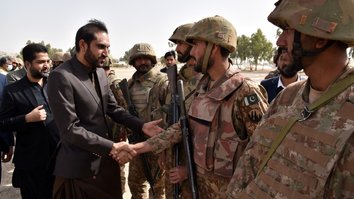QUETTA -- Security forces in Balochistan province have killed more than two dozen militants of different banned groups in response to a recent surge in attacks in Quetta and other parts of the province, say officials.
"The intelligence-based raids were carried out in Mastung, Harnai and Panjgur areas of Balochistan," said Mohsin Javed, a Quetta-based senior security official.
"Heavy weapons, ammunition and explosives were also recovered from terrorist hideouts," he added.
Security forces on October 23 killed nine members of the Balochistan Liberation Army (BLA) in the Roshi area of Mastung district, Javed said, adding that the militants had been involved in several recent attacks on security forces and government bases in the province.
The mountainous camp where the raid took place was used for training, he said.
On the same day, the Frontier Corps North Wing conducted a separate intelligence-based operation in the Jambro area of Harnai, killing six militants including a BLA commander, Inter-Services Public Relations said in a statement.
During another operation in Mastung on October 22, counter-terrorism forces killed nine members of the "Islamic State of Iraq and Syria" (ISIS) after they received a tip-off from one of their sources.
Meanwhile, in a separate raid on October 22 on the outskirts of Panjgur district, security forces killed at least two suspects of a banned group involved in several attacks on security forces, according to Tufail Baloch, a Gwadar-based security official.
Militant groups have been wreaking havoc in Panjgur, among other areas in Balochistan, for years, he said.
"The Makran belt of Balochistan is adjacent to the Iranian border, so militants often flee to Iran after attacks," he added.
"Restoring peace is one of the government's top priorities. The recent special counter-terrorism operation is part of the stated strategy," he said.
Authorities take strict action against groups who are disturbing the peace in the region for the benefit of outsiders, Baloch said, adding, "Those who shed the blood of innocent people do not deserve any concessions."
"Development cannot continue here without ending the insurgency. The locals want peace and are co-operating fully with security forces in this special counter-terrorism move," he added.
Evolving situation
Changes in the regional security situation can be linked to the recent spate of counter-terror operations, say analysts.
"The current situation in Balochistan needs to be seen in the context of the changing scenario in the region. What is happening here has a direct impact on Pakistan's domestic and foreign policy," an Islamabad-based senior intelligence official told Pakistan Forward on the condition of anonymity.
"Balochistan is the gateway to Central Asia, and the foreign investment made here in the future may affect the interests of some countries; therefore, they do not want stability," he said.
"I think that the rapid rise of insurgency in Balochistan could be detrimental to security as well as economic issues," said the official. "How can foreign companies that want to invest here in the energy sector and other sectors operate in an unsafe environment?"
Members of ISIS-K, ISIS's Khorasan branch, have been trying to enter nearby countries after the Taliban took power in Afghanistan, he said.
"Since the formation of the Taliban government, the Baloch militants hiding in Kandahar and other parts of Afghanistan are reportedly moving back to Pakistan, which could create more security challenges for the country," said Maj. (ret.) Omar Farooq, an Islamabad-based senior defence analyst.
If the government does not take serious action in dealing with the rising issue of militancy, the foreign investment flowing here could be severely affected, he said.
"Balochistan has been in turmoil for the last three decades. Banned militant groups fighting for independence have not been able to achieve their goal so far," said Farooq.
"These militants want to put pressure on the government to stop the flow of foreign investment and development in the province," he said.
It is essential to take comprehensive measures to eradicate terrorism and its support network in the country, said Farooq.

![Pakistani soldiers stand guard next to an armoured vehicle as people wait on the Pakistani side of the Afghan border in Chaman on October 5. The Taliban's takeover of Afghanistan in August has led some militant groups to become more active, say analysts. [AFP]](/cnmi_pf/images/2021/10/27/32329-000_9p6669__1_-585_329.jpg)






